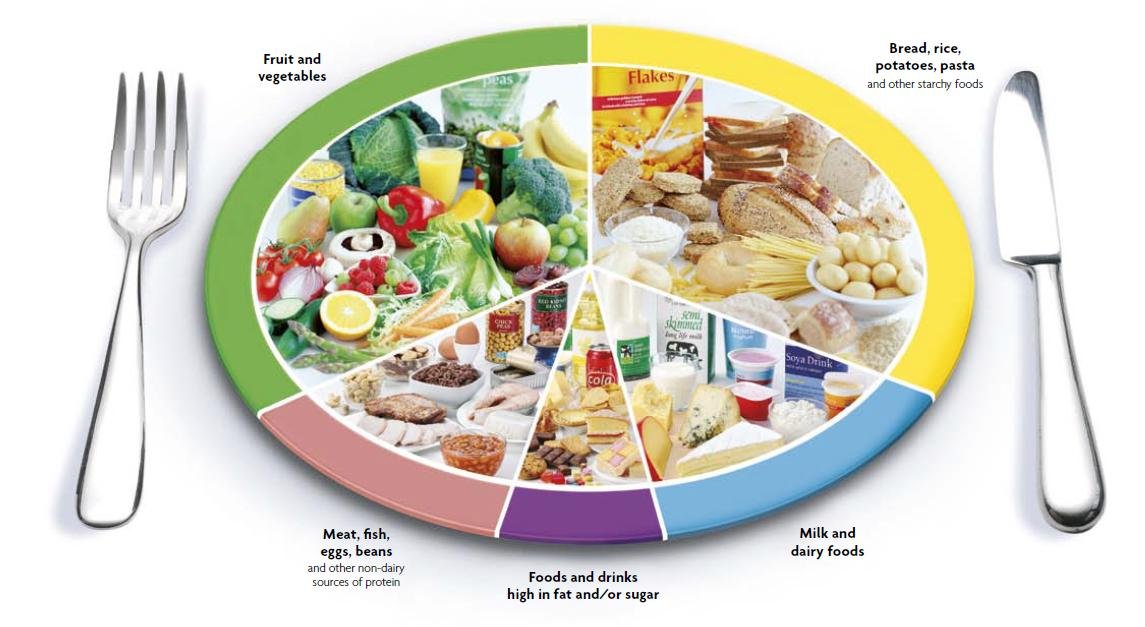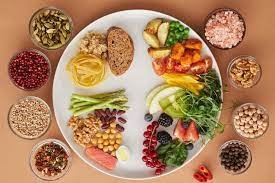Introduction
A balanced diet is one that gives your body the nutrients it needs to function correctly. To get the proper nutrition from your diet, you should consume most of your daily calories in fresh fruits and vegetables, whole grains, legumes, nuts, and lean proteins. Many people know the importance components of balanced diet, but it can be difficult to implement it.
To get started, you should learn about the various components needed to enjoy a healthy balanced diet. A healthy balanced diet is also indicative of a proportioned diet. This means that you’re not only eating the right food items, but you’re also eating them in the proper amounts. Adopting a balanced diet not only boosts your health, but also helps with weight loss.
Why is a balanced diet so crucial?
A components of balanced diet is crucial because it provides essential nutrients that support overall health, maintain energy levels, and prevent chronic diseases. It promotes optimal body function, including immune support and mental well-being. Eating a variety of nutrient-rich foods helps sustain a healthy weight and reduces the risk of health issues.
The 7 components of a balanced diet are Carbohydrates, Proteins, Fats, Vitamins, Minerals, Fiber and Water. These are the nutrients that make a balanced diet. Let’s dive into the7 components that make up a balanced diet and how each contributes to our overall health lifestyle.
Carbohydrates
Carbohydrates are the body’s primary energy source. They fuel your brain health, kidneys health, healthy heart muscles, and central nervous system. Carbohydrates come in two main forms: simple and complex. Simple carbohydrates are found in fruits, milk, and vegetables, while complex carbohydrates are found in whole grains, legumes, and starchy vegetables.
Sources of Healthy Carbohydrates:
- Whole grains: Brown rice, quinoa, oats, and whole wheat bread
- Vegetables: Sweet potatoes, broccoli, carrots, and leafy greens
- Fruits: Apples, bananas, berries, and oranges
- Legumes: Beans, lentils, and chickpeas
Proteins
Proteins are vital for building and repairing tissues, making enzymes and hormones, and supporting immune function. They are made up of amino acids, which are the building blocks of muscles, skin, and bones. Proteins can be complete (containing all essential amino acids) or incomplete (lacking one or more essential amino acids).
Animal vs. Plant-Based Protein Sources:
- Animal-based: Chicken, fish, eggs, dairy products, and lean meats
- Plant-based: Beans, lentils, tofu, quinoa, nuts, and seeds
Fats
Fats often get a bad rap, but they are essential for storing energy, protecting our organs, and aiding in the absorption of vitamins. The key is to focus on healthy fats while limiting harmful ones. Fats can be classified into saturated, unsaturated, and trans fats.
Differentiating Between Good and Bad Fats:
- Good fats: Monounsaturated and polyunsaturated fats found in avocados, nuts, seeds, olive oil, and fatty fish like salmon
- Bad fats: Saturated fats found in red meat and full-fat dairy, and trans fats found in many processed foods
Benefits of Healthy Fats:
- Heart health: Reduce the risk of heart disease
- Brain function: Support cognitive function and mental health
- Inflammation: Help reduce inflammation in the body
Vitamins
Vitamins are organic compounds that are crucial for growth, reproduction, and maintaining health. They are divided into two categories: fat-soluble (A, D, E, K) and water-soluble (B-complex and C). Each vitamin has a specific role, and a deficiency in any of them can cause health problems.
Key Vitamins and Their Sources:
- Vitamin A: Carrots, sweet potatoes, spinach, and kale
- Vitamin C: Oranges, strawberries, bell peppers, and broccoli
- Vitamin D: Fatty fish, fortified dairy products, and sunlight exposure
- Vitamin E: Nuts, seeds, green leafy vegetables, and vegetable oils
Minerals
Minerals are inorganic elements that our bodies need to function. They are important for bone health, heart health, and brain function, among other things. Minerals are divided into major minerals (needed in larger amounts) and trace minerals (needed in smaller amounts).
Essential Minerals and Where to Find Them:
- Calcium: Dairy products, fortified plant milks, leafy greens, and almonds
- Iron: Red meat, beans, fortified cereals, spinach, and lentils
- Potassium: Bananas, potatoes, spinach, and avocados
- Magnesium: Nuts, seeds, whole grains, and dark chocolate
Fiber
Fiber is a type of carbohydrate that the body can’t digest. It helps regulate the body’s use of sugars, keeping hunger and blood sugar in check. Fiber is divided into soluble (dissolves in water) and insoluble (does not dissolve in water). High-fiber diets can also reduce the risk of heart disease and type 2 diabetes.
High-Fiber Foods to Include in Your Diet:
- Whole grains: Barley, oatmeal, whole wheat bread, and brown rice
- Fruits: Apples, berries, pears, and oranges
- Vegetables: Broccoli, Brussels sprouts, carrots, and green beans
- Legumes: Lentils, black beans, chickpeas, and peas
Water
Water is critical for survival. It makes up about 60% of our body weight and is involved in numerous bodily functions. Staying hydrated helps with digestion, absorption, circulation, water help in weight lose and temperature regulation. The general recommendation is to drink at least 8 glasses (64 ounces) of water a day, but individual needs can vary based on activity level, climate, and health status.
Tips for Adequate Water Intake:
- Drink a glass of water with each meal and between meals
- Carry a water bottle with you during the day
- Eat water-rich foods like fruits and vegetables
- Set reminders to drink water if you often forget
Creating a Balanced Meal Plan
Incorporating all seven components into your daily meals can be straightforward. Aim for variety and balance across all food groups. Here’s a sample meal plan:
Breakfast:
- Whole grain oatmeal topped with fresh berries and a handful of nuts
- A glass of water or herbal tea
Lunch:
- Grilled chicken salad with a mix of leafy greens, colorful vegetables, and a vinaigrette dressing
- A serving of whole grain bread
- A glass of water or freshly squeezed juice
Snack:
- Apple slices with almond butter or a handful of mixed nuts
- A glass of water
Dinner:
- Baked salmon with quinoa and steamed broccoli
- A side of mixed green salad
- A glass of water or herbal tea
Hydration:
- Aim for at least 8 glasses of water throughout the day
Common Misconceptions About a Balanced Diet
Many people believe that eating a balanced diet means giving up their favorite foods or following strict dietary rules. However, it’s more about moderation and variety. It’s also a common misconception that you need expensive supplements to achieve a balanced diet. In most cases, whole foods provide all the necessary nutrients. Another myth is that all fats are bad, but as we discussed, healthy fats are crucial for good health.
Benefits of a Balanced Diet
Adopting a balanced diet can have numerous benefits, including:
- Improved energy levels: Balanced meals provide consistent energy throughout the day, avoiding the highs and lows caused by sugary snacks and drinks.
- Better mental health: Nutrient-rich foods can improve mood and cognitive function, reducing the risk of depression and anxiety.
- Weight management: Balanced diets help maintain a healthy weight by promoting satiety and reducing cravings, leading to better control over calorie intake.
- Reduced risk of chronic diseases: Proper nutrition can prevent heart disease, diabetes, and certain cancers by supporting overall health and immune function.
Challenges in Maintaining a Balanced Diet
Maintaining a components of balanced diet can be challenging due to busy schedules, accessibility to healthy foods, and social influences. To overcome these obstacles, try meal prepping, keeping healthy snacks on hand, and educating yourself about nutrition. Planning your healthy meals in advance can save time and ensure you have balanced options available. Also, gradually making small changes rather than drastic overhauls can make the transition smoother and more sustainable.
The Role of Physical Activity
Complementing a balanced diet with regular physical activity enhances overall health. Exercise helps control weight, reduces the risk of chronic diseases, and improves mental health. Aim for at least 150 minutes of moderate aerobic activity or 75 minutes of vigorous activity each week. Activities like walking, cycling, swimming, and strength training can be part of a balanced exercise routine.
Dietary Adjustments for Specific Needs
Different life stages and health conditions require tailored diets. For example:
- Children: Need more calcium and vitamin D for bone development, along with balanced portions of proteins, carbohydrates, and fats.
- Pregnant women: Require extra folic acid, iron, calcium, and protein to support fetal development and maternal health.
- Elderly: May need more calcium and vitamin D to maintain bone health, and adequate fiber to support digestion.
- People with specific medical conditions: Such as diabetes or heart disease, may need to adjust their intake of certain nutrients, like reducing sugar and salt.
Conclusion
A Components of balanced diet is vital for maintaining overall health and well-being. By understanding and incorporating the seven essential components—carbohydrates, proteins, fats, vitamins, minerals, fiber, and water—you can make healthier food choices that benefit your body and mind. Remember, it’s not about strict dietary rules or giving up your favorite foods, but rather about enjoying a variety of nutrient-rich foods in moderation.
FAQs
What is the best way to start eating a balanced diet?
Start by incorporating more whole foods into your meals and gradually reducing processed foods. Focus on variety and balance across all food groups.
How can I tell if my diet is balanced?
A balanced diet typically includes a variety of foods from all the major food groups, providing essential nutrients in the right proportions.
Are supplements necessary for a balanced diet?
While whole foods are the best source of nutrients, supplements can be beneficial in certain situations, such as for people with specific nutrient deficiencies or dietary restrictions.
How does a balanced diet affect mental health?
A diet rich in fruits, vegetables, whole grains, and lean proteins can improve mood and cognitive function by providing essential nutrients that support brain health.
Can a balanced diet help with weight loss?
Yes, a balanced diet can aid in weight loss by promoting satiety, reducing cravings, and ensuring you get the necessary nutrients without excess calories.



